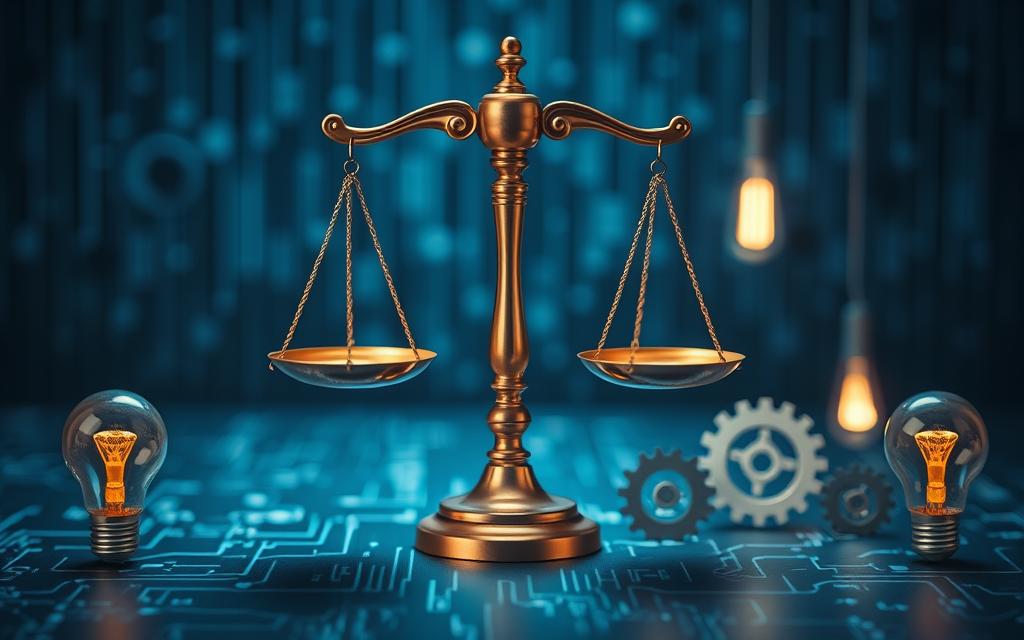Legal and Ethical Considerations in Content
Did you know about 70% of American adults have seen false information online? This shows how important it is to have strong rules for making content. With deepfakes and fake stories, creators must be very careful online.
Keeping things honest and trustworthy is key for creators and the internet. Legal and ethical rules are important for content makers. They help follow laws and do the right thing. This part talks about why these rules matter, from copyright to keeping data safe.
Key Takeaways
- Legal and ethical considerations are essential to maintain credibility in digital content.
- The rise of misinformation impacts public opinion and calls for responsible content creation.
- Copyright laws play a crucial role in protecting the integrity of creative figures.
- Data privacy compliance is vital to maintain audience trust in content marketing.
- Establishing clear ethical guidelines can address challenges in digital content creation.
- Fact-checking and moderation are key strategies to combat misinformation.
Understanding the Importance of Legal and Ethical Standards
Legal and ethical standards are key for credibility and trust in content creation. Following content regulations helps avoid legal issues like plagiarism. Using plagiarism detection tools is crucial for originality, preventing legal problems and maintaining ethical standards.
The Federal Trade Commission (FTC) requires ads to be truthful and based on real facts. Honest marketing builds trust and improves brand image. In fact, 63% of consumers prefer buying from ethical brands.
Data privacy laws like GDPR and CCPA make respecting consumer privacy essential. Following these laws builds trust and shows data is handled well. Consumers expect brands to be ethical and accountable.
Culturally sensitive copywriting is crucial for global marketing success. Knowing cultural differences and language helps avoid misunderstandings. Companies must balance business goals with ethical standards. Clear ethical guidelines help make decisions that meet legal and ethical requirements.
The Rise of Deepfakes and Misinformation
The digital world has seen a big change with deepfakes. This technology, known since 2017, can change videos and audio. It raises big questions about ethics and laws.
Deepfakes can harm people’s identities without their okay. This leads to identity theft and manipulation. It’s a big problem for keeping content true.
Deepfakes are getting better, which means they can be used for bad things. They can change what people think and even affect elections. It’s hard to know what’s real and what’s not.
This can hurt more than just someone’s reputation. It can damage trust in our democracy. It’s a big deal for society.
Companies need to step up to fight deepfakes. They should make tools to find out if something is fake. They also need to set rules for everyone to follow.
Teaching people about deepfakes is also key. If more people know about it, they can spot and report fake stuff. This helps keep the online world honest.
Protecting Digital Privacy in Content Creation
In today’s digital world, keeping digital privacy safe is very important. Content creators must follow laws to protect data. They need to get user consent and be clear about how they use data.
Breaking these rules can cause big problems. Creators might face fines and lose their reputation.
Technology is key in today’s businesses, so privacy is crucial. Companies must use smart, cost-effective, and fair methods to protect data. They should also think about the social impact of their actions.
Ignoring these steps can lead to serious issues. It can harm users and damage trust.
Creators should follow rules like the International Data Privacy Principles. These help make data policies better, especially when working across different places. Being open about any conflicts of interest helps build trust.
It’s also important to be truthful and accurate. This stops misinformation from spreading.
When sharing personal info, creators must think about the ethics. They should always get consent, especially for sensitive topics. This helps create content that is respectful and fair.
Legal rules and ethics go hand in hand in content creation. Creators must act responsibly. For more on AI and content creation, check out this article.
Legal and Ethical Considerations in Content
Understanding the legal side of content creation is key. It helps protect creators and ensures ethical standards are met. Copyright laws are central to this, giving original works the recognition and protection they need.
Copyright Laws and Content Creation
In the U.S., copyright law automatically protects original works like photos, music, and writing. This law gives creators special rights, like the right to copy and distribute their work. Not following these rules can lead to legal trouble.
It’s important to get permissions and give credit to the original creators. This is essential for creating content ethically.
Intellectual Property Rights Protection
Intellectual property laws are strong in today’s digital world. They help protect creators’ rights. Works from before 1923 and government documents are in the public domain, meaning they can be used freely.
This helps educators and researchers use content without breaking copyright laws. It’s a way to share knowledge while respecting creators’ rights.
Fair Use Doctrine Explained
The fair use doctrine is a key rule for using copyrighted material without permission. It looks at how the material is used, the type of work, and its impact on the market. It balances protecting creators with encouraging creativity and sharing ideas.

Data Privacy Compliance in Content Marketing
Data privacy compliance is key in ethical content marketing. Laws like GDPR and CCPA change how businesses work. The GDPR makes it clear that data collection must be open and honest.
Marketers must update their privacy policies to meet these standards. This shows they care about legal rules and customer trust. Not following these rules can lead to big fines and damage to reputation.
The CCPA in California gives people more control over their data. This is a trend that’s spreading across the country. Laws like the Virginia Consumer Data Protection Act (VCDPA) also protect consumer rights.
Companies that respect these laws build stronger customer loyalty. A big 87% of consumers want to work with companies that protect their data privacy.
Privacy laws stress the need for clear consent from users. Transparency and informed consent are key in collecting data. Marketers should focus on ethical data handling.
They should do regular audits and explain how data is used. Having a Data Protection Officer (DPO) is also important to ensure compliance.
Apple’s iOS updates have made tracking harder for marketers. This means they might get less data from links. But, using zero and first-party data can help build trust with consumers.
Following laws like GDPR and CCPA shows a company’s values. Good data protection strategies, like encryption, are essential. Training team members on data privacy is also crucial.
Doing this not only meets legal standards but also builds trust. A big 76% of consumers will avoid brands that don’t protect their privacy well.
By focusing on data privacy, marketers can create a better future. They respect consumer wishes and protect their rights.
Companies that value data privacy are more likely to be seen as good brands. A huge 94% of consumers will stay loyal to brands that are open about their data handling.
This loyalty is a big advantage in a competitive market. For more on ethical marketing practices, check out this resource.
Strategies for Ethical Digital Content Creation
Creating content ethically is more important than ever in today’s fast-changing digital world. Creators must focus on content integrity best practices to gain trust from their audience. They need to set clear rules for ethical content, like checking facts and getting consent for personal data. Being open about how content is made helps build trust and confidence with viewers.
Establishing Clear Ethical Guidelines
Having clear ethical rules helps fight misinformation and supports ethical content making. These rules should cover fact-checking, being open, and respecting personal data. Adding labels to AI-made content can help stop misinformation combat. This way, creators keep their work honest and give viewers reliable info. For more on this, check out strategic content creation approaches that connect with audiences.
Investing in Fact-Checking and Moderation
It’s key to invest in fact-checking and moderation to keep content honest. Having teams or working with fact-checkers ensures content is right and relevant. This effort stops false info and makes the platform safer and better for users. With AI in content making, humans must check it to keep standards high. These steps help creators fight misinformation better.

Audience Sensitivity and Inclusivity in Content
Creating content that shows audience sensitivity and supports inclusivity is key today. When people from different backgrounds see themselves in content, it boosts engagement and loyalty. This shows a commitment to understanding and respecting different cultures.
Inclusive content can open up new markets and reach out to groups that were overlooked before. Using gender-neutral language and visuals helps avoid stereotypes. It also makes the content more welcoming to everyone.
Being aware of unconscious bias is important in making content. When creators tackle stereotypes, they help prevent harmful stories and support marginalized communities. Tools like biased language detectors can help make content more inclusive. Doing deep research on the audience helps tailor content to fit different backgrounds and interests.
Working with diverse voices makes content more authentic and ensures it covers different viewpoints. Using inclusive language is crucial to avoid making assumptions or leaving out certain groups. Also, making content accessible to people with disabilities shows respect for all users.
Conclusion
In today’s digital world, creators must balance their creativity with legal and ethical rules. Knowing these rules helps build trust and integrity online. It makes the internet a safer place for everyone.
Understanding legal and ethical rules is key to creating good content. It shows respect for others’ work and follows the law. This way, creators can make content that is honest and trustworthy.
As technology changes, it’s important for creators to think about their impact. Using ethics in content creation builds trust. This helps the online community grow and thrive.
FAQ
What are the key legal considerations content creators should be aware of?
Content creators need to know about copyright laws, intellectual property rights, and fair use. This helps them avoid infringement and protect their work.
Why is ethical content creation important?
Creating content ethically builds trust and credibility with audiences. It makes marketing efforts more effective and keeps a brand’s reputation strong.
How can deepfakes be ethically used in content creation?
Deepfakes can entertain and innovate in the entertainment world. But, creators must get consent, prevent identity theft, and avoid manipulation to stay ethical.
What are the implications of data privacy compliance?
Following data privacy laws like GDPR and CCPA is key. It protects user information and ensures data usage is transparent. This avoids legal trouble.
What practices can help prevent copyright infringement?
To avoid copyright infringement, get permissions, credit original sources, and understand Fair Use. These steps protect content integrity.
How can content creators combat misinformation?
Content creators can fight misinformation by setting clear ethical guidelines, fact-checking, and being open about data use. This is crucial in stopping the spread of false information.
What does inclusivity in content creation entail?
Inclusivity means accurately showing diverse groups and avoiding stereotypes. It also means making content accessible for people with disabilities. This creates a respectful online space.
What are the repercussions of neglecting legal and ethical standards in content?
Ignoring legal and ethical standards can lead to legal trouble, loss of trust, and damage to a brand’s reputation. This can hurt a creator’s success.







